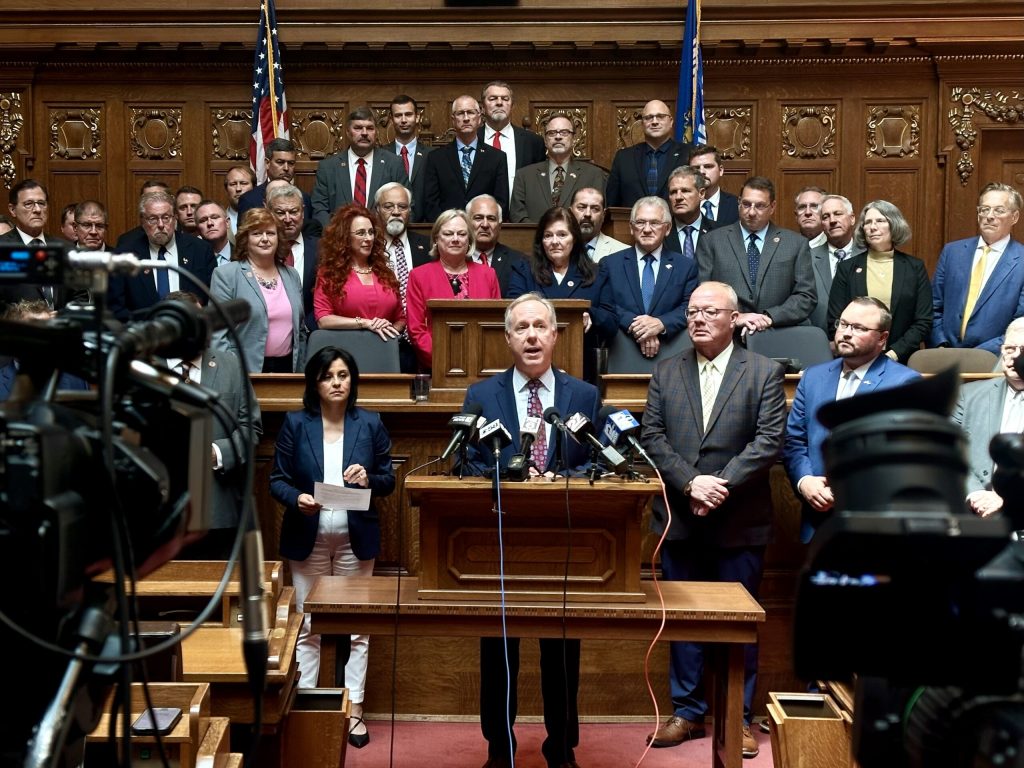Evers, GOP Lawmakers Beat Congress, Trump To Punch On Hospital Funding
Wisconsin could see additional $1.2 billion in federal Medicaid matching funds because of state budget passage.

Assembly Speaker Robin Vos, R-Rochester, flanked by Assembly Republicans, addresses reporters ahead of a vote on the state budget on July 2, 2025. Anya van Wagtendonk/WPR
Wisconsin lawmakers and Gov. Tony Evers raced Wednesday and into Thursday to enact a state budget before President Donald Trump could sign his sweeping budget bill into law.
The stakes were high. If Congress’s budget had become law first, Wisconsin could have lost out on more than $1 billion in federal funds to help the state pay for its BadgerCare medical assistance program and help hospitals offset losses from treating low-income patients. That’s because of sweeping changes to Medicaid in the federal bill.
And the Wisconsin Legislature and Evers beat their federal counterparts across the finish line.
The showdown was related to what the federal government calls the “provider tax,” which is known in Wisconsin as a “hospital assessment” fee paid by hospitals and other health care providers. The money is matched by the federal government, with the proceeds being split to reimburse providers and bolster Wisconsin’s medical assistance program.
The reason it was so important for state lawmakers to pass their budget before Trump’s “One Big Beautiful Bill Act” became law is because, in an effort to save money for the federal government, that law will cap how much states can charge hospitals. That was seen as a big problem for Wisconsin because its 1.8 percent assessment hasn’t changed since 2009 and was well below what other states charge.
The state budget compromise struck between Evers and state Senate leaders from both parties raised the hospital assessment to 6 percent, which means Wisconsin can qualify for more than $1.2 billion in additional federal matching funds.
Wisconsin Hospital Association President Kyle O’Brien said that likely works out to something like an additional $700 million per year for health care providers in the Badger State. He said that will cover only about half of the estimated $1.6 billion in losses due Medicaid’s reimbursement rate, but “it will certainly help address the challenges we face.”
O’Brien said the hospital association has lobbied members of Congress to “treat Wisconsin fairly” with regard to its lagging reimbursement, to no avail.
“Thankfully, the governor and through bipartisan leadership in the Legislature, we believe that they’re doing everything that they can to partner with us to make that a reality,” O’Brien said.
When he announced the bipartisan state budget deal Tuesday, Evers mentioned the federal legislation and called it “time of significant uncertainty from the federal government” and said the budget would “limit this type of policy change in the future.”
As state lawmakers took up the budget on Wednesday, Assembly Speaker Robin Vos, R-Rochester, also acknowledged that Congress and Trump were keen on capping the Medicaid assessments.
“Look, I would not necessarily have a problem with having reform of the system,” Vos told reporters. “But I think as long as it’s allowed under federal law, the state of Wisconsin should be no different, and we would take advantage of that by doing this hospital assessment.”
Senate Majority Leader Devin LeMahieu, R-Oostburg, was asked if Evers had to sign his budget first in order to spare hospitals from being locked in at the lower rate. He said, “That’s why we’re working really fast to get it done.”
Despite the joining-of-hands over the budget compromise’s impact on Wisconsin hospitals, Democrats at both the state and national level are still raising the alarm about Trump’s bill.
After the bill eked through the U.S. Senate on Tuesday, thanks to a tie-breaking vote from Vice President JD Vance, U.S. Sen. Tammy Baldwin said she was “disgusted” by the prospect of millions of Americans losing access to health insurance through Medicaid. U.S. Rep. Gwen Moore, D-Milwaukee, took to social media and claimed “TRILLIONS of cuts to Medicaid” and “MILLIONS of people losing health coverage” were all designed to “lavish more on the wealthiest among us.”
Meanwhile, Republicans in Wisconsin’s congressional delegation have largely focused on the bill’s permanent extension of federal tax cuts passed during Trump’s first term in 2016. U.S. Rep. Bryan Steil, R-Janesville, posted a selfie of himself and U.S. Rep. Tony Wied, R-De Pere, seated on a plane destined for Washington, D.C.
“Off to DC to deliver the OBBB [“One Big, Beautiful Bill”] for President Trump’s signature,” Steil wrote.
Back in Washington on Wednesday, U.S. Rep. Derrick Van Orden, R-Prairie du Chien, posted an attack on fellow GOP lawmakers in the House Freedom Caucus, which claimed the Senate’s tweaks will increase the federal deficit by more than $1.3 trillion.”
“Hiding behind the flag of fiscal conservatism is costing Americans trillions of dollars,” Van Orden said.
According to a copy of a letter obtained by WISN reporter Matt Smith, Van Orden also urged Evers to sign the state budget before Trump’s bill is enacted.
Back at home, Wisconsin Office of Rural Health Director John Eich said he’s still waiting to see what comes from Congress and the president, but he’s glad to see the state Legislature and governor taking action.
“I just have to say, from the Office of Rural Health, that we really appreciate what the Legislature and the governor are doing to work in a bipartisan fashion to come together to protect Wisconsin rural and urban health care,” Eich said.
Gov. Tony Evers, GOP lawmakers beat Congress and Trump to the punch on hospital funding was originally published by Wisconsin Public Radio.
If you think stories like this are important, become a member of Urban Milwaukee and help support real, independent journalism. Plus you get some cool added benefits.





















